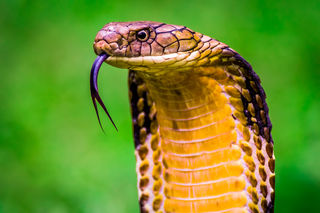Fear
Why We Fear
Research suggests that we may have evolved to fear threats like snakes.
Posted October 17, 2016

Many animals are genetically programmed to fear their predators. Mice naturally fear cats; fish naturally fear birds. These fears don't have to be learned, they are inborn—the product of natural selective forces that rewarded such fears in the evolutionary past.
Are also humans also naturally disposed to fear certain dangerous animals?
It is certainly true that we fear some things more than others—snakes, spiders, rats—but this could be the result of conditioning more than programming. Perhaps we learn to fear snakes and spiders because they bite us and we fear rats because we are taught that they spread disease.
Or maybe not. Scientists who study fear conditioning have noticed that it is easier to train humans to fear snakes and spiders than things like friendly dogs and fluffy pillows. This is especially true for children—indeed, some very young children are afraid of these animals before ever encountering or hearing about them.
There appears to be a preconditioned human tendency to fear snakes and spiders. This makes sense because throughout human evolution, these animals have accounted for countless deaths; having an inborn avoidance instinct would create a distinct survival advantage, especially for young children.

These studies have revealed that humans are predisposed to fear snakes and spiders, though there is no universal and firmly programmed fear of them.
Plenty of people actually love snakes and spiders and keep them as pets or study as part of their career. For these people, in the absence of a conditioning event, the predisposition toward fearing these animals was never triggered.
If humans really are predisposed to fear snakes and spiders, we might expect to see this in some of our close relatives as well. After all, the lethal danger posed by these critters is in no way restricted to human beings. Obviously, we would not expect to find it in animals that have evolved to hunt snakes or spiders, because they would have necessarily lost any such aversion. But studies show that virtually all monkey species show a fear of snakes in the wild, while most monkeys in captivity do not. However, this does not address the issue of predisposition. Most humans are not born afraid of snakes, but they are much more likely to become afraid of them than they are most other kinds of animals. The question is: Do other primates show a predisposition toward fearing snakes or spiders?
To answer this, Susan Mineka and Michael Cook at Northwestern University conducted a set of clever experiments with rhesus monkeys that revealed that the connection between predisposition and exposure is even more intricate than previously thought. In this experiment, the researchers tried to train naïve monkeys to fear snakes by having them watch videos of other monkeys behaving fearfully toward snakes or crocodiles.
The result: The monkeys actually “caught” the fear of snakes and crocodiles. No monkeys were actually harmed, and no fear conditioning with loud sounds, shocks, or pain took place. The observer monkeys simply watched the sounds and body language of the monkeys in the videos and inferred that they were afraid of the snakes and crocodiles. This shows that, in monkeys, the fear of danger can be learned from others, not just through direct experience.
The experiment went a step further: The vicarious fear conditioning was not effective when the researchers attempted to train the monkeys to fear flowers. In this setup, the researchers had to use creative splicing and editing to create convincing videos of rhesus monkeys behaving as though they were afraid of some artificial flowers. However, when other monkeys watched this video, they did not acquire any conditioned fear of real or artificial flowers.
It’s possible that the monkeys’ fear response was just not easily fooled into fearing things that were not harmful. But I don’t think that’s the case; how would they know the flowers weren’t harmful? These were lab monkeys. They had no prior exposure to snakes or flowers. Instead, I think this fascinating experiment shows that there is a preprogrammed predisposition toward fearing snakes and crocodiles in monkeys.
It turns out that most primates fear snakes as much as most humans do—and for good reason. Throughout the long evolutionary history of primates, snakes have consistently been among their most deadly predators. We can now say with some confidence that the human tendency to fear snakes was almost certainly inherited from our primate ancestors.
Anthropologist Lynne Isbell has made the controversial claim that detection and avoidance of snakes has had a substantial impact on the evolution of primate vision, fear, and intelligence. Her thesis holds that, in primates, including humans, one of the main evolutionary forces in the honing of our visual skills was our constant need to spot and identify snakes. Then we developed the fear and avoidance of those snakes. Finally, natural selection favored primates that were able to remember where the snakes were, figure out how they hunted, learn to avoid them, and so on.
In other words, according to Isbell, one of the strongest forces driving the rapid development of primate intelligence was avoiding and outsmarting snakes.
I might not go that far, but it seems undeniable that a fear of snakes is not so much a phobia as an ancient, natural, and justified fear of a lethal predator.
I agree with Indiana Jones on this one: Man, I hate snakes.




